

QIP Parents. Multi-media presentations. National Quality Framework. What does the NQF mean for your service?
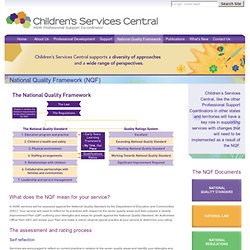
In NSW, services will be assessed against the National Quality Standard by the Department of Education and Communities (DEC). Your service will need to reflect on its practices with respect to the seven quality areas and then prepare a Quality Improvement Plan (QIP) outlining your strengths and areas for growth against the National Quality Standard. An Authorised Officer from DEC will review your Plan and make a visit to observe typical practice at your service to determine your rating. Files.acecqa.gov.au/files/Assessment and Rating/2014/Guide A_R Services 2.pdf. Files.acecqa.gov.au/files/Assessment and Rating/2014/Assessment and rating report template.pdf.
Assessment, Rating and Compliance. Community Child Care Co-operative » Sample policies. The sample policies below are for information purposes only.
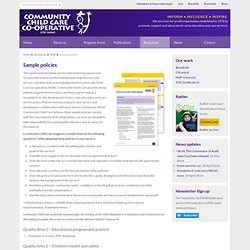
You are welcome to use this material and adapt to your own service’s situation with acknowledgement to Community Child Care Co-operative (NSW). Community Child Care provides these policies as general information and they may be used as a foundation for the development of your own education and care service policy. Policies must be unique to your service and developed in collaboration with your service community. Whilst Community Child Care believes these sample policies comply with the requirements of the Regulations, services are advised to take responsibility for assessing the relevance and accuracy of the material.
Community Child Care suggests consideration of the following questions* while adapting these policies to your service: Files.acecqa.gov.au/files/Assessment and Rating/2014/The assessment and rating report final.pdf. Files.acecqa.gov.au/files/Assessment and Rating/1-NQS_Assessment and Rating Instrument_120522_ FINAL-1.pdf. NQF Video Resources. Home Introducing the National Quality Framework.
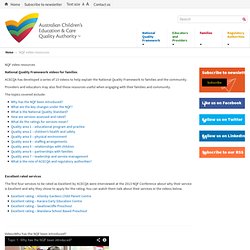
Assessment of equivalent educator qualifications. An individual with education and care qualification(s) not listed on any of the approved qualifications lists can apply to ACECQA to have their qualifications assessed for equivalence.
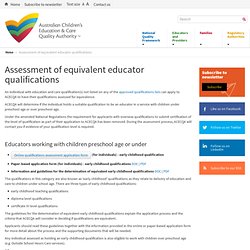
ACECQA will determine if the individual holds a suitable qualification to be an educator in a service with children under preschool age or over preschool age. Under the amended National Regulations the requirement for applicants with overseas qualifications to submit certification of the level of qualification as part of their application to ACECQA has been removed. During the assessment process, ACECQA will contact you if evidence of your qualification level is required. Educators working with children preschool age or under The qualifications in this category are also known as ‘early childhood’ qualifications as they relate to delivery of education and care to children under school age.
Early childhood teaching qualificationsdiploma level qualificationscertificate III level qualifications Sydney NSW 1235. ACECQA. Home The below list contains all approved and former approved early childhood teaching, diploma and certificate III level qualifications, including Queensland specific qualifications.
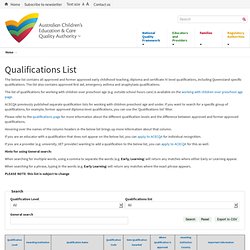
The list also contains approved first aid, emergency asthma and anaphylaxis qualifications. The list of qualifications for working with children over preschool age (e.g. outside school hours care) is available on the working with children over preschool age page. ACECQA previously published separate qualification lists for working with children preschool age and under. If you want to search for a specific group of qualifications, for example, former approved diploma level qualifications, you can use the 'Qualifications list' filter. National Registers. The national registers are an important part of the NQF as they help families assess the quality of approved education and child care services across the country.
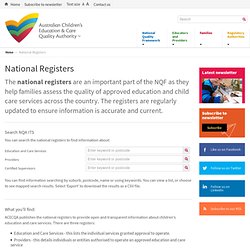
The registers are regularly updated to ensure information is accurate and current. What you'll find: How to promote your service's rating. Receiving a quality rating under the National Quality Framework is exciting for your service, your educators, your families and your local community.
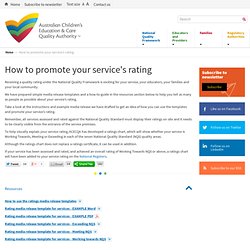
We have prepared simple media release templates and a how-to-guide in the resources section below to help you tell as many as people as possible about your service’s rating. Take a look at the instructions and example media release we have drafted to get an idea of how you can use the templates and promote your service’s rating. Excellent Rating. The Excellent rating is the highest rating an education and care service can achieve.
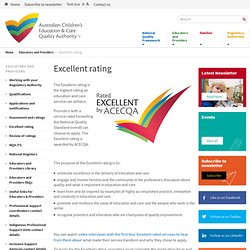
Providers with a service rated Exceeding the National Quality Standard overall can choose to apply. The Excellent rating is awarded by ACECQA. The purpose of the Excellent rating is to: celebrate excellence in the delivery of education and careengage and involve families and the community in the profession’s discussion about quality and what is important in education and carelearn from and be inspired by examples of highly accomplished practice, innovation and creativity in education and carepromote and reinforce the value of education and care and the people who work in the sectorrecognise providers and educators who are champions of quality improvement. You can watch video interviews with the first four Excellent rated services to hear from them about what made their service Excellent and why they chose to apply.
Applications. Media.wix.com/ugd/76ebc5_644d8cc6b785864b988063b316616056. Reading Financial Reports. Translated resources. NQF Guides Browser - Public edition. The National Quality Framework In December 2009 all Australian governments, through the Council of Australian Governments (COAG), agreed to a partnership to establish a National Quality Framework for Early Childhood Education and Care (‘National Quality Framework’).
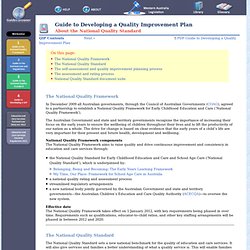
The Australian Government and state and territory governments recognise the importance of increasing their focus on the early years to ensure the wellbeing of children throughout their lives and to lift the productivity of our nation as a whole. The drive for change is based on clear evidence that the early years of a child’s life are very important for their present and future health, development and wellbeing. National Quality Framework components The National Quality Framework aims to raise quality and drive continuous improvement and consistency in education and care services through: Effective date The National Quality Framework takes effect on 1 January 2012, with key requirements being phased in over time.
See: Free hard copies of learning resources! Www.eecsrsb.sa.gov.au. Www.stmorrischildcare.com.au/policy.pdf. Five fast facts: qualification requirements for 2014. Information sheets. Www.earlychildhoodaustralia.org.au/nqsplp/wp-content/uploads/2013/07/Reflecting-on-2-busy-days_ShelleyForbes. Policies and procedures- how to write. Www.adelaide.edu.au/childcare/adelaide/news/Final_Adelaide_Campus_Assessment_and_Rating_Report.pdf. National Registers. Framework for integrated early childhood development. This framework for integrated early childhood development aims to support integration across the early childhood development sector.
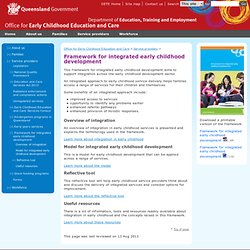
An integrated approach to early childhood service delivery helps families access a range of services for their children and themselves. Some benefits of an integrated approach include: improved access to services opportunity to identify any problems earlier enhanced referral pathways enhanced provision of holistic responses. Overview of integration An overview of integration in early childhood services is presented and explains the terminology used in the framework. Learn more about integration in early childhood Model for integrated early childhood development This is a model for early childhood development that can be applied across a range of services. Learn more about the model Reflective tool. Shortside E-Newsletter. Deta.qld.gov.au/earlychildhood/pdfs/framework.pdf.
Www.lutheran.edu.au/assets/Uploads/pr/general/SchooLink/SCHOOLINKVol183.pdf. Community Child Care Co-operative » NQF. The most current documents Searching the internet for the most current NQF documents? Community Child Care NSW commits to ensuring we always have the most current version of the most important NQF documents right here. (Please refresh your browser every time you visit this page to ensure you get the current version). Sample NQF Compliant Policies Community Child Care Co-operative (NSW) is pleased to make available a range of policies that meet the requirements of the National Quality Framework. Sample NQF Compliant Policies - Go to link ‘NQF In A Box’ website information The ‘NQF In A Box’ website is a special benefit for Community Child Care members and associates.
Members can click here to access – www.ccccnsw.org.au/members/nqf-in-a-box If you would like to become a member to access this website please click here – www. ccccnsw.org.au/members/register Simple Guides for Preschools and LDCs Did you know CCCC has a NQF Blog?
National Quality Standard Professional Learning Program - NQS PLP. Framework for School Age Care.